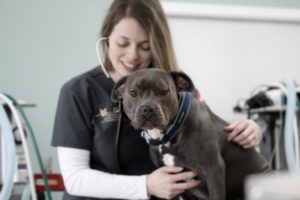Preventive Care for Senior Dogs
February 3, 2021 - 15 minutes read Like humans, dogs go through many different life stages, and these stages are accompanied by changes in care. As puppies mature, we might switch their food or change their exercise regimes. As dogs move into the senior life stage, their needs may change again, and many dog owners wonder what they should be doing differently for elderly pups. Below, Dr. Kellyn McNulty, a member of the Dog Aging Project veterinary team, addresses some of these frequently asked questions.
Like humans, dogs go through many different life stages, and these stages are accompanied by changes in care. As puppies mature, we might switch their food or change their exercise regimes. As dogs move into the senior life stage, their needs may change again, and many dog owners wonder what they should be doing differently for elderly pups. Below, Dr. Kellyn McNulty, a member of the Dog Aging Project veterinary team, addresses some of these frequently asked questions.
Please keep in mind that all dogs are different. Thus the information below should be considered merely a starting point for further consultation with your primary care veterinarian. The absolute best source for specific preventive healthcare for your dog is their primary care veterinarian.
How often should I take my senior dog to the veterinarian?
During the puppy and adult life stages, annual wellness checks are recommended. However, once a dog becomes a senior, more frequent visits are warranted. The Senior Care Guidelines for dogs (and cats 😻) issued by the American Animal Hospital Association recommend a visit to the veterinarian every six months for senior animals. While this might seem excessive, consider how this compares to human health care. Given that dogs age at a faster rate than humans, taking a senior dog to the veterinarian every six months is equivalent to an elderly human going to their primary care provider once every two to three years! A lot can change in a short period of time for older animals.
What signs should I look for that would prompt me to take my aging dog to the veterinarian sooner than six months?
As discussed in previous blog posts about defining aging in dogs and understanding behavioral changes with age, there are a variety of physical and mental changes that can occur as part of aging. However, some of these same characteristics can also be signs of a disease process. Differentiating the two can be difficult. Some clinical signs that are generally NOT expected with normal aging and would definitely warrant a visit to your veterinarian include:
- Vomiting
- Diarrhea
- Increased panting or difficulty breathing
- Increased or decreased appetite or thirst
- Increased or decreased frequency of urination or suddenly having accidents in the house
- New, especially quickly growing, masses
- Significant, sudden, or worsening lethargy
- Not willing to engage in normal activity
- Collapse
- Seizure
- Belly looking distended or more ‘full’ than normal
- Pain*
* Sometimes pain can be difficult to detect, especially in stoic dogs. If you observe your dog having difficulty getting up from a resting position, lying or sitting in an odd position, limping or exhibiting stiffness, being unwilling to use stairs, jump in the car or jump up on the couch, constantly changing positions (unable to settle), or no longer wanting to be petted, it may indicate that your dog is in pain.
Once I get to the veterinarian’s office, what should I discuss with my veterinarian? What information about my older dog is important to mention?
Since dogs can’t talk, we have to be their voice in the exam room. Sharing the following information with your veterinarian, in addition to any other changes or concerns that you notice at home, is one of the BEST ways to facilitate detection of new diseases and allow early intervention.
Changes in your dog’s routine or environment. Telling your veterinarian that your dog no longer goes to doggie daycare or that you just acquired a new puppy can be crucial pieces of information in determining what all preventive healthcare your dog needs.
Changes to your dog’s physical activity or behavior. Even if some of these end up being due to the aging process, it is always advised to bring all of these changes to the attention of your veterinarian because they may be caused by an underlying health problem.
Diet, treats, and supplements. Being able to tell your veterinarian the exact diet, treats and supplements your dog is consuming is very helpful. The best way to accurately convey this information is either to bring the product with you to the visit or take a picture of all sides of the container. Diets that appear very similar can in fact be extremely different in nutrient and calorie content. Your veterinarian can help you pick the best one for your dog.
Preventive (i.e. flea/tick/heartworm) medications or therapeutic (i.e. for an illness or disease) medications your dog is taking. The easiest way to do this is to bring ALL of your dog’s medications to each veterinary visit and keep a written “cheat sheet” that details specifics of how and when you give the medications, including medication name, strength (mg) or concentration (mg/ml), amount of medication given, and the frequency and timing of dosing. All of this information is essential for a veterinarian to accurately assess the efficacy of a preventive care and/or treatment regimen.
What does a veterinarian assess during my dog’s physical exam?
Although it may not seem like much, there is a staggering wealth of information your veterinarian gains by conducting a comprehensive physical exam. Just by watching your dog in the exam room, we can pick up on things such as mental alertness, attitude, energy level, mobility, and breathing patterns. We take vital parameters such as weight, temperature, heart rate (pulse), and breathing rate (respiration). We assess overall body condition, muscle condition, and pain as well as checking out each body system in detail.
During the exam, your veterinarian is unlikely to mention when an examined body system ‘checked out normal’ as we tend to focus our attention on the areas that need attention, but trust me, your veterinarian is doing a very detailed analysis of every body system (eyes, ears, mouth, teeth, nose, throat, lymph nodes, lungs, heart, abdomen, external genitalia, rectum, skin and coat, limbs and paws, muscles, bones and joints, and neurologic system). When your veterinarian does not tell you anything negative about a body system or tells you a body system looks or sounds good, that actually means a TON!
Your veterinarian may request routine diagnostic tests that change as your dog ages. It’s pretty standard for dogs to be tested annually for heartworm disease and other infectious or parasitic diseases. For senior dogs, they may also request a complete blood count, chemistry, urinalysis, and fecal analysis. If abnormalities are found in any of these tests, then additional diagnostics such as more in-depth lab work, x-rays, or ultrasound may be recommended, or you may be referred to a specific veterinary specialist such as a cardiologist or internist.
If you are ever curious or would like to know more about what your veterinarian is assessing during a physical exam or why they are ordering specific diagnostic tests, never hesitate to speak up and ask. We’re always happy to talk to our clients about their dogs’ health and well-being!
What vaccinations should my senior dog receive?
Every senior dog is different, and your veterinarian is the best to give recommendations about vaccinations for your pup. Many senior dogs have been vaccinated multiple times throughout their lives. Sometimes, veterinarians may advise an alteration to a senior dog’s vaccine regimen, but in other cases, no change will be made. This decision may be influenced by multiple factors such as exposure to other dogs in or outside the house, frequency of grooming or boarding, exposure to environmental risk factors, current medications, and current health conditions.
What preventive medications should my senior dog take?
The American Animal Hospital Association and American Veterinary Medical Association Preventive Healthcare Guidelines for Dogs and Cats recommend that every dog should receive a year-round, broad-spectrum parasite control with efficacy against heartworms, internal parasites, fleas, and ticks, depending on environmental risk factors. Unless otherwise instructed by your veterinarian, senior dogs should remain on the same preventive medications they received when they were younger.
What diet and supplements should my senior dog take?
There is no “one-size-fits-all” when it comes to canine diets and supplements, especially for older dogs. Some older dogs are diagnosed with health conditions that warrant a specialized diet or supplement. However, just because a dog reaches senior status does not automatically mean that they need to be switched to a new senior diet or given certain supplements. The best way to determine the most appropriate diet for your senior dog and whether they need or would benefit from supplements is to discuss their health with your primary veterinarian. It is always advisable to have this discussion before making any changes or adding any supplements because even seemingly benign changes such as adding a joint supplement could be problematic for your pup depending on the product chosen and their current health status.
Is dental care important for my senior dog?
Routine dental care is important for dogs of all ages. Bad “dog breath” is not normal for dogs. In fact, that smell indicates that there is overgrowth of bacteria and likely an active infection in your dog’s mouth that could be harmful and painful. Older dogs have a higher risk of dental disease and its negative consequences; thus, dental care is very important for older dogs. Speak with your dog’s veterinarian during a veterinary exam to determine if your dog has dental disease and what the most appropriate treatment and future preventive care should be.
 Whether your dog is young or old, regular veterinary wellness visits are vitally important for canine health. Early detection and diagnosis of a wide variety of health conditions can improve prognosis and slow the progression of disease. Age-specific preventive care suggestions can help dogs live longer, healthier lives, a goal that veterinarians like me, whether in private practice or at the Dog Aging Project, strive toward every single day. Working together with dedicated and loving owners such as all of our Dog Aging Project participants, we really can have a huge, positive impact on the quality of life for all dogs, young and old!
Whether your dog is young or old, regular veterinary wellness visits are vitally important for canine health. Early detection and diagnosis of a wide variety of health conditions can improve prognosis and slow the progression of disease. Age-specific preventive care suggestions can help dogs live longer, healthier lives, a goal that veterinarians like me, whether in private practice or at the Dog Aging Project, strive toward every single day. Working together with dedicated and loving owners such as all of our Dog Aging Project participants, we really can have a huge, positive impact on the quality of life for all dogs, young and old!

Kellyn McNulty, DVM
Research Team
Feature photo by Kerri Lee Smith
Tags: Senior Dogs